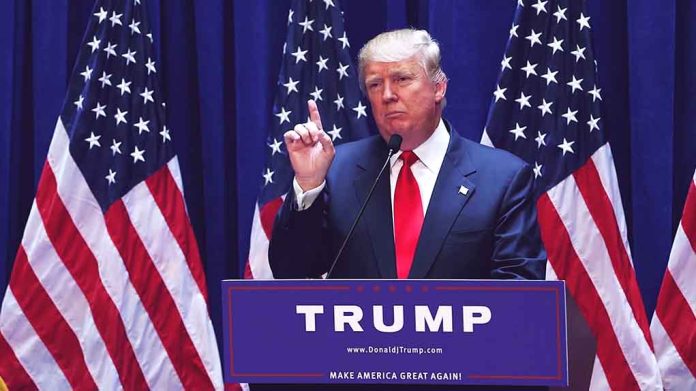
Donald Trump vows to challenge Biden’s federal telework extension deal, setting the stage for a legal battle over remote work policies.
At a Glance
- Trump plans to sue to block a 5-year extension of hybrid work for federal employees
- The agreement, made by former SSA Commissioner Martin O’Malley, affects 42,000 SSA workers
- Trump criticizes the deal as a “gift to a union” and aims to reduce federal bureaucracy
- Republican lawmakers and Trump allies support ending remote work for federal employees
- AFGE defends the agreement, citing increased productivity and efficiency
Trump’s Opposition to Federal Telework Agreement
President elect Donald Trump has announced plans to challenge a recent telework agreement for federal workers, setting the stage for a potential legal battle. The agreement, negotiated by former Social Security Administration Commissioner Martin O’Malley and the American Federation of Government Employees (AFGE), extends hybrid work flexibility for 42,000 SSA employees until 2029.
Trump has been vocal in his opposition to the deal, characterizing it as excessive and detrimental to government efficiency. During a press conference at Mar-a-Lago, Trump stated, “They just signed this thing—it’s ridiculous. So, it was like a gift to a union, and we’re going to obviously be in court to stop it.”
“They just signed this thing—it’s ridiculous,” Trump said at a press conference at Mar-a-Lago in Florida on Dec. 16.
***PRESS RELEASE***
Trump-Endorsed Jimmy Patronis Pledges to Join the DOGE Caucus in Congress
~Patronis Proposes Banning of Telework for Major Federal Agencies~[FT. WALTON BEACH / 12-16-24] – Today, Florida Chief Financial Officer (CFO) Jimmy Patronis announced that he plans…
— Jimmy Patronis (@JimmyPatronis) December 16, 2024
Republican Pushback and Proposed Changes
Trump’s stance aligns with many Republican lawmakers who argue that COVID-era telework policies have decreased productivity. The president elect has proposed creating a Department of Government Efficiency (DOGE) to cut costs and regulations. This move is part of a broader plan to reduce federal bureaucracy and potentially save $2 trillion by eliminating waste and fraud.
“If people don’t come back to work, come back into the office, they’re going to be dismissed.” – Donald Trump
Trump’s allies, including Elon Musk and Vivek Ramaswamy, support ending remote and hybrid work for federal employees. They argue that requiring in-office presence could lead to voluntary terminations, potentially streamlining the federal workforce. Republican Representatives James Comer and Marjorie Taylor Greene have also voiced opposition to the agreement, viewing it as an attempt to “Trump-proof” the federal bureaucracy.
President-elect Donald Trump has made recent statements indicating his intent to challenge a work-from-home arrangement for federal employees that was secured under the Biden administration. This deal, agreed upon by the American Federation of Government Employees (AFGE) and the…
— Clarence Terrell (@clarenceTerre) December 16, 2024
Union Defense and Potential Legal Battle
The American Federation of Government Employees is prepared to defend the agreement legally. AFGE argues that hybrid work has increased productivity and efficiency, emphasizing that only 10% of federal workers are fully remote. AFGE National President Everett Kelley stated that the union would defend the telework protections, highlighting the benefits of remote work for government efficiency and disaster preparedness.
“Requiring federal employees to come to the office five days a week would result in a wave of voluntary terminations that we welcome: If federal employees don’t want to show up, American taxpayers shouldn’t pay them for the Covid-era privilege of staying home.” – Elon Musk and Vivek Ramaswamy
The union maintains that collective bargaining agreements are binding and enforceable, setting the stage for a potential legal showdown if Trump pursues his planned lawsuit. This clash highlights the ongoing debate about the future of telework within federal sectors and its impact on government efficiency and employee satisfaction.
Broader Implications for Federal Workforce
The controversy surrounding the telework agreement extends beyond the immediate legal challenge. It raises questions about the future of work in the federal government and the potential impact on recruitment and retention of talented employees. Supporters of telework argue that flexible work arrangements are crucial for attracting and retaining skilled workers in a competitive job market.
“If people don’t come back to work, come back into the office, they’re going to be dismissed.” – Donald Trump
However, critics, including Washington, D.C., Mayor Muriel Bowser, support the return of federal workers to the office to revitalize the city. The debate also touches on issues of government spending and accountability, with some arguing that empty government buildings funded by taxpayers are wasteful. As the legal challenge unfolds, it will likely spark continued discussions about balancing employee flexibility with government efficiency and taxpayer interests.
Sources:
- Trump Vows Lawsuit to Block Biden Admin’s Hybrid Work Extension Deal
- Trump: Feds will be ‘dismissed’ if they don’t go to office
- Trump says federal workers who don’t want to return to the office are “going to be dismissed”
- Key union vows to fight back after Trump says he would end remote work for federal employees














